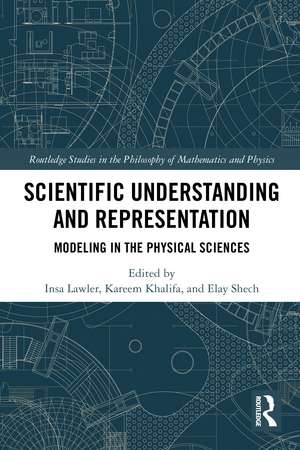Scientific Understanding and Representation: Modeling in the Physical Sciences: Routledge Studies in the Philosophy of Mathematics and Physics
Editat de Insa Lawler, Kareem Khalifa, Elay Shechen Limba Engleză Paperback – 26 aug 2024
In the philosophy of science, questions of scientific understanding and scientific representation have only recently been put in dialogue with each other. The chapters advance these discussions from a variety of fresh perspectives. They range from case studies in physics, chemistry, and neuroscience to the representational challenges of machine learning models; from special forms of representation such as maps and topological models to the relation between understanding and explanation; and from the role of idealized representations to the role of representation and understanding in scientific progress.
Scientific Understanding and Representation will appeal to scholars and advanced students working in philosophy of science, philosophy of physics, philosophy of mathematics, and epistemology.
| Toate formatele și edițiile | Preț | Express |
|---|---|---|
| Paperback (1) | 403.91 lei 6-8 săpt. | |
| Taylor & Francis – 26 aug 2024 | 403.91 lei 6-8 săpt. | |
| Hardback (1) | 900.51 lei 6-8 săpt. | |
| Taylor & Francis – 13 dec 2022 | 900.51 lei 6-8 săpt. |
Preț: 403.91 lei
Nou
Puncte Express: 606
Preț estimativ în valută:
77.29€ • 80.54$ • 63.99£
77.29€ • 80.54$ • 63.99£
Carte tipărită la comandă
Livrare economică 03-17 aprilie
Preluare comenzi: 021 569.72.76
Specificații
ISBN-13: 9781032065816
ISBN-10: 1032065818
Pagini: 428
Ilustrații: 40
Dimensiuni: 152 x 229 mm
Greutate: 0.79 kg
Ediția:1
Editura: Taylor & Francis
Colecția Routledge
Seria Routledge Studies in the Philosophy of Mathematics and Physics
Locul publicării:Oxford, United Kingdom
ISBN-10: 1032065818
Pagini: 428
Ilustrații: 40
Dimensiuni: 152 x 229 mm
Greutate: 0.79 kg
Ediția:1
Editura: Taylor & Francis
Colecția Routledge
Seria Routledge Studies in the Philosophy of Mathematics and Physics
Locul publicării:Oxford, United Kingdom
Public țintă
Academic, Postgraduate, and Undergraduate AdvancedCuprins
1. Introduction, Kareem Khalifa, Insa Lawler, and Elay Shech; Part I: Understanding, Knowledge, and Explanation; 2. Can Scientific Understanding be Reduced to Knowledge?, Henk W. de Regt; 3. Should Friends and Frenemies of Understanding be Friends? Discussing de Regt, Kareem Khalifa; 4. Frenemies or Friends? A Reply to Kareem Khalifa, Henk W. de Regt; 5. Onwards, My Friend! Reply to de Regt, Kareem Khalifa; 6. Factivism in Historical Perspective: Understanding the Gravitational Deflection of Light, Sorin Bangu; 7. Ideal Patterns and Non-Factive Understanding, Mazviita Chirimuuta; 8. Topological Explanations: An Opinionated Appraisal, Daniel Kostić; 9. Explanatory Power: Factive vs. Pragmatic Dimension, Juha Saatsi; Part II: Understanding and Scientific Realism; 10. Understanding the Success of Science, Christopher Pincock; 11. Truth and Reality: How to be a Scientific Realist Without Believing Scientific Theories Should be True, Angela Potochnik; 12. Defensible Scientific Realism: A Reply to Potochnik, Christopher Pincock; 13. Different Ways to be a Realist: A Response to Pincock, Angela Potochnik; 14. Realism About Molecular Structures, Amanda J. Nichols and Myron A. Penner; 15. Anti-Fundamentalist Lessons for Scientific Representation from Scientific Metaphysics, Julia R.S. Bursten; Part III: Understanding, Representation, and Inference; 16. Factivity, Pluralism and the Inferential Account of Scientific Understanding, Jaakko Kuorikoski; 17. Scientific Representation and Understanding: A Communal and Dynamical View, Collin Rice; 18. Representation and Understanding are Constitutively Communal but Not Constitutively Historical, Jaakko Kuorikoski; 19. Which Modal Information and Abilities Are Required for Inferential Understanding?, Collin Rice; 20. Maps, Models, and Representation, James Nguyen and Roman Frigg; 21. DEKI, Denotation, and the Fortuitous Misuse of Maps, Jared Millson and Mark Risjord; 22. DEKI and the Mislocation of Justification: A Response to Millson and Risjord, Roman Frigg and James Nguyen; 23. DEKI and the Justification of Surrogative Inference: A Response, Jared Millson and Mark Risjord; 24. How Values Shape the Machine Learning Opacity Problem, Emily Sullivan; 25. Understanding from Deep Learning Models in Context, Michael Tamir and Elay Shech; 26. Link Uncertainty, Implementation, and ML Opacity: Some Clarifications, Emily Sullivan; 27. Expecting Too Much from Our Machine Learning Models, Elay Shech and Michael Tamir; Part IV: Understanding and Scientific Progress; 28. Understanding the Progress of Science, C. D. McCoy; 29. Scientific Progress Without Justification, Finnur Dellsén; 30. The Significance of Justification for Progress: A Reply to Dellsén, C. D. McCoy; 31. Scientific Progress without Problems, Finnur Dellsén.
Recenzii
"This collection not only brings together issues in scientific understanding, representation and explanation but allows the authors the rare opportunity to directly engage with each other’s works and thereby advance the debate." – Steven French, University of Leeds, UK
Notă biografică
Insa Lawler is Assistant Professor of Philosophy at the University of North Carolina at Greensboro, USA.
Kareem Khalifa is Professor of Philosophy at Middlebury College, USA. He is the author of Understanding, Explanation, and Scientific Knowledge (2017).
Elay Shech is Associate Professor of Philosophy at Auburn University, USA.
Kareem Khalifa is Professor of Philosophy at Middlebury College, USA. He is the author of Understanding, Explanation, and Scientific Knowledge (2017).
Elay Shech is Associate Professor of Philosophy at Auburn University, USA.
Descriere
This volume brings together leading scholars working on understanding and representation in philosophy of science. It features a critical conversation format between contributors that advances debates concerning scientific understanding, scientific representation, and their delicate interplay.










